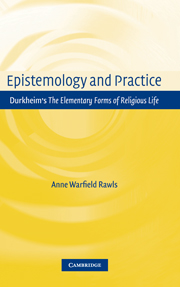Book contents
- Frontmatter
- Contents
- Acknowledgments
- Introduction
- 1 Durkheim's Outline of the Argument in the Introductory Chapter
- 2 Durkheim's Dualism: an Anti-Kantian, Anti-Rationalist Position
- 3 Sacred and Profane: the First Classification
- 4 Totemism and the Problem of Individualism
- 5 The Origin of Moral Force
- 6 The Primacy of Rites in the Origin of Causality
- 7 Imitative Rites and the Category of Causality
- 8 The Category of Causality
- 9 Logic, Language and Science
- 10 Durkheim's Conclusion Section iv: Logical Argument for Social Origin of the Categories
- Conclusion
- Bibliography
- Index
4 - Totemism and the Problem of Individualism
Published online by Cambridge University Press: 22 September 2009
- Frontmatter
- Contents
- Acknowledgments
- Introduction
- 1 Durkheim's Outline of the Argument in the Introductory Chapter
- 2 Durkheim's Dualism: an Anti-Kantian, Anti-Rationalist Position
- 3 Sacred and Profane: the First Classification
- 4 Totemism and the Problem of Individualism
- 5 The Origin of Moral Force
- 6 The Primacy of Rites in the Origin of Causality
- 7 Imitative Rites and the Category of Causality
- 8 The Category of Causality
- 9 Logic, Language and Science
- 10 Durkheim's Conclusion Section iv: Logical Argument for Social Origin of the Categories
- Conclusion
- Bibliography
- Index
Summary
Having argued, in Book I, that the distinction between the sacred and profane, and through that distinction, ultimately, the concept of classification, had its origin in the division of society into totems, it was then important for Durkheim to establish in Book II, two things about Totemism: First, that totems as emblem and practice had a collective origin, and not an individual origin as many anthropologists had argued; and Second, that it is not the thing represented by the totem that is the origin of the sacred, but rather the totemic emblem itself. Establishing these two points also involves a Third argument, about moral force, the experience that makes the emblem sacred.
If the totemic divisions, which give rise to the concept of classification, had an individual origin, Durkheim's argument, that the category of classification is available in ritual experience, would be a circular one. That is, he would have avoided the problem of individualism by basing the validity of human reason on social practices and ideas which, ultimately, had an individual origin. In order to avoid this problem, Durkheim engages in extensive refutations of those arguments that treat Totemism as an individual phenomenon.
An equally serious challenge to Durkheim's position is presented by the belief, held by most scholars of Totemism, that it is the things represented by totems that initially give rise to the idea of the sacred.
- Type
- Chapter
- Information
- Epistemology and PracticeDurkheim's The Elementary Forms of Religious Life, pp. 139 - 161Publisher: Cambridge University PressPrint publication year: 2005

